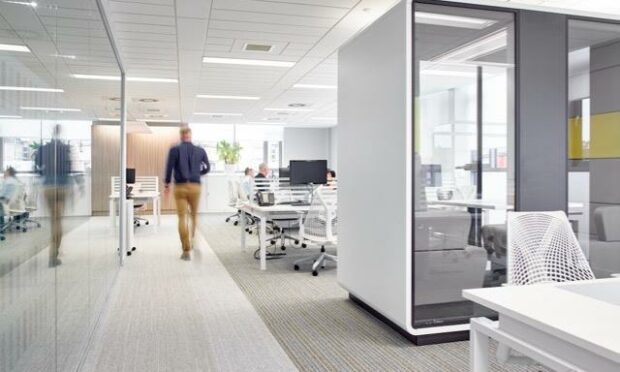The next generation of offices will continue the shift towards agile shared space to support collaboration and concentration, according to workplace consultancy Space Solutions Group.
Remote technology provision and flexible working are now embedded into most workplace planning, but research also shows that most meetings involve only up to four people and can take place in a semi-enclosed environment.
This will mean more focus on communal areas, an emphasis on flexible meeting spaces and being mindful of ongoing Covid-19 risk, with a focus on preventative measures such as hygiene stations and using materials that are easy to clean.
The collective experience of home working is likely to accelerate a move towards more agile working.”
Phil Muir, Space Solutions
According to Aberdeen-based Space Solutions, post-Covid offices are likely to feature:
- Multiple work settings rather than fixed workstations
- Shared and not owned space
- Support of and trust in employees rather than “command and control”
- Collaborative and connected working in the office, rather than Individual contributions or autonomous working
- Technology that enables instead of inhibits
- Better support for concentrated tasks
Space Solutions has created a range of services for organisations to evaluate how to adapt their offices to the new circumstances and changed working arrangements post-Covid.
Phil Muir, consultancy and design director at the firm said: “Companies who think strategically about their office space and follow through with authentic actions typically attract the best talent, and have higher retention rates, and a happier and more productive workforce.
“The collective experience of home working is likely to accelerate a move towards more agile working, where work is a ‘thing that you do’ and not a ‘place where you go’. This will require the elements of people, place and technology to work together more than ever.”
Noise remains a critical factor, Space Solutions said, adding the proliferation of video calls and meetings will mean people will demand quiet space where they can carry out concentrated tasks and areas where they can collaborate virtually without disturbing others.
Space Solution’s own research over the past year of lockdown shows what worked for employers, what was unexpected and what changes are worth keeping as more businesses prepare to return to offices.
Pre-pandemic, the uptake of regular working from home was low in many organisations as managers expected staff to be in the office.
No significant impact on productivity
“Successful home working since March 2020 has surely overturned this attitude”, Space Solutions said, adding: “Numerous workplace surveys during lockdown reported no significant drop in productivity with staff working remotely.”
But working remotely is challenging for many people and junior staff especially can be negatively affected by the loss of interaction, the firm said.
And on health and hygiene in the workplace, it said: “Attitudes have changed and the design of communal spaces, choice of materials and cleaning will take on a new level of importance.”
Mr Muir added: “We believe the solution to flexibility lies in a robust space planning strategy – not in technology itself which cannot be predicted, but in the infrastructure and the strategic allocation of building fixes.”
Rosen Group takes second office unit at Citibase in Aberdeen’s west end
Change Management: Your guide for getting back to the workplace

